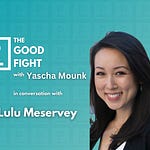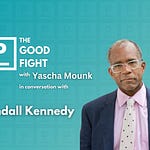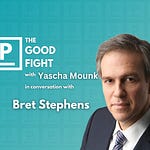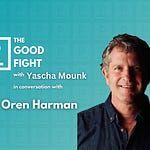The best way to make sure that you don’t miss any of these conversations is to subscribe to The Good Fight on your favorite podcast app. If you are already a paying subscriber to this Substack or Persuasion, this will give you ad-free access to the full conversation, plus all full episodes and bonus episodes we have in the works! If you aren’t, you can set up the free, limited version of the feed—or, better still, support the podcast by becoming a subscriber today!
And if you are having a problem setting up the full podcast feed on a third-party app, please email our podcast team at leonora.barclay@persuasion.community
Irshad Manji is the founder of Moral Courage College, which equips people worldwide to turn heated issues into healthy conversations and sustained teamwork. Her latest book is Don’t Label Me: How to Do Diversity Without Inflaming the Culture Wars.
In this week’s episode, Yascha Mounk and Irshad Manji discuss how it feels to become a U.S. citizen during turbulent times, how to have conversations about controversial topics without being canceled, and how to resist the temptation of being right about everything.
Polarization is at an all-time high. It can feel daunting—perhaps even misguided—to engage in meaningful dialogue with those holding starkly different views. What does it mean to champion pluralism in such a moment? Persuasion’s series on the future of pluralism, generously supported by the Arthur Vining Davis Foundations, features longform essays and podcast interviews that make the case for civic dialogue and highlight inspiring examples of it in practice. You can find the full series here.
This transcript has been condensed and lightly edited for clarity.
Yascha Mounk: I know that you became a U.S. citizen recently. Why? Isn't this the wrong time to become a citizen of the United States of America?
Irshad Manji: Well, it's funny you should say that, Yascha, because when I told many of my U.S. friends that I just became naturalized, a number of them—including a few conservative friends—offered their condolences. They actually said things to me like, are you sure you want to do this? And when I told my Canadian friends—very few of whom are conservative—they offered their congratulations. This is a really interesting turning of the tables because Canadians have historically been pretty insecure about their identity, especially living right next to the great elephant that is the United States. But over the years, and well before Trump 2.0, Canadians have gained a confidence that belies Trump's own arrogance in starting a war with Canada. Canadians are ready to win that war, let me tell you.
All of that to say that I really love the people of America. I know this is a massive generalization, but I travel the country routinely for my work and I find the people here infinitely more generous, outgoing, relational and kind than I do in just about any other country, including the one that I gratefully was raised in, Canada. So, this is the reason that I stay. What about you? You're a recent immigrant, or I shouldn't say recent immigrant, but you were naturalized, what, about five years ago?
Mounk: That's right. I was naturalized at another strange moment, which was a few months after Trump was first elected president. I think a lot of the reason for that was that I remained committed to the fundamental political values of the United States—to the basic precepts enshrined in the United States Constitution—but also that I remained pretty optimistic about the ability of the United States to function as a deeply diverse democracy. I thought that America was much more likely than many other places in the world to succeed in this attempt to have ethnic and religious diversity as part of a common enterprise and a common polity. Now, in some ways, I've become more optimistic about that since 2017. It's heartening, for example, that knowing the color of the skin, ethnicity or race of a voter today tells you less about who they're going to vote for than it did eight years ago. But in other ways, I am more concerned now than I used to be. I worry about our ability to avoid falling into very deep polarization that might undermine those basic political values for which I signed up. I guess that's an interesting comparative case: How does it feel in 2025 versus 2017 to be an American citizen, and how much hope do you retain about our ability to sustain this experiment?
Manji: Can I explain why I have more hope than perhaps the average left-of-center person? I see things at a very granular level, precisely because my work has me interacting with people in their day-to-day settings. And the day after the November election, I was already scheduled to be speaking to a large group of educators in the heartland. I started by asking them how they're feeling. You can imagine there was a lot of silence, and then I heard someone in the front row whimper a little. She was crying. I asked her to open up about that and what she told me was very heartening. She said, all I can tell you is that I am committing myself to being more present for my community, my neighborhood, my locale than I have ever been in my life, because that is where I know I belong. That is where I know I can have influence. And as I was listening, I noticed—out of the corner of my eye—somebody waving something from the very back of the room. I finally turned and looked, and it was a fellow educator waving Kleenex. She wanted me to give it to this person in the front row.
Now, that might sound like a nothingburger to many of our listeners. But let me tell you, Yascha: this is an example of what I love about the United States and its people. When it comes time to help one another, they do—not just in the biggest ways, but in the smallest ways, too. I must tell you, I typically don't see that in Canada. What I see is people complaining about the government not doing enough even when there is a local crisis. Now, again, I want to acknowledge that these are broad generalizations. But it’s precisely because I wasn’t sensing a grassroots solidarity—except now, with Trump’s threat to Canada's sovereignty—that the contrast struck me. Before that, I had not been picking up the kind of grassroots solidarity in my country of Canada that I have always noticed in America. I'd like to believe that not only will that continue, but maybe it will even fortify as a result of people recognizing that national politics should not poison meaningful relationships on the ground.
Mounk: I absolutely agree with that commitment. The question is, at what point does that commitment break down? I have a good friend who's Croatian and she grew up partially before the civil war, but then spent part of her childhood there during the Yugoslav civil war. I always found it very striking when she said that it was all made by politicians and imposed from above; the ordinary people there had never had any problems. To some extent, I think she probably idolized that point of view and came from a social circle that was probably much more multinational and cosmopolitan within Yugoslavia than many other social circles. She grew up in a big city rather than the countryside and so on. On the day-to-day, neighbours can get along, know each other and have respect for each other. But if things on a political level become bad enough, then that might not rescue us. Now, I'm not saying that we're about to have an ethnic civil war in the way that Yugoslavia did. I think that's extremely unlikely. But, perhaps the day-to-day kindness of people, the solidarity, the open-mindedness, the tolerance—all of which are parts of American life, in my view—can coexist with the political anger, with the willingness to tear down a system, with the determination to remake your country in ways that can turn out to have very bad consequences.
Manji: That’s absolutely right. This is why anybody who either feels massive despair or blithe optimism about where we're headed really isn't paying attention to the complexities of any human systems, not just America. The whole idea of a complex system is that it's unpredictable. Human beings are not machines. We can't simply have one part of us replaced and then it's all good and we're back on script or at least back to what's expected of us. No, we are adaptive creatures. So, it stands to reason that in different contexts, different aspects of us are going to be coming out. This is why I believe so profoundly in the power of relational leadership. When we enter into even contentious conversations, the way we show up—curious or judgemental—will influence how the conversation goes. Will it actually remain a conversation or will it become a confrontation? So, for anybody who cares to appreciate that we still have agency at a time like this, it's actually more of a responsibility for us to use our agency in order to shape the outcomes that we want in our lives. We can't control politicians. God knows that's true. But we can take charge of our own dispositions and thereby deepen trust or alleviate distrust in our environments.
Mounk: What do you think that means concretely? I'm sure a lot of listeners to this podcast agree with what you just said. They have a desire to be in touch with their compatriots in that kind of way and to build those kinds of links. But I think the exhortation to do that can sometimes sound a little bit abstract. It can sound a little bit like, go out and do those things, we somehow need them to happen. But how do we do that, especially without setting aside our fundamental differences and disagreements in a way that might feel inauthentic? Is there a way of being in community with people who really do have fundamental political differences from us, in a way that neither lets those differences stop us from being able to see our mutual humanity and the values we might share, nor requires us to artificially check them at the door?
Manji: I believe that there is not just the possibility, but actually the beauty here of taking a “both-and” approach to everyday life in which you can stand your ground and also create common ground. Let's just parse that for a second. Standing your ground is about what you believe. That's part of who you are. That is what a lot of people consider part and parcel of their integrity. So, I'm not for a moment suggesting that we dilute or violate our own convictions. Not at all. Creating common ground is really about how you express what you believe. Come from that place of curiosity rather than judgment, and genuinely want to know each other's backstory, ask sincere questions about that backstory and listen not merely to understand, but to learn, regularly. The way we listen these days is often reduced to simply mouthing the words, I hear you. No, no, no, I hear you. I hear you, and then going right back to our own agenda. As if other people are our playthings and objects for our agenda.
Now, I'm not so sure I agree with your point of view. Research repeatedly shows that we humans actually don't need to be agreed with. What we need to be is just heard. Most people, I think, to this day, conflate hearing others with agreeing with them. When we indulge in that conflation, we often—but not always—swallow this trope that now we’re being complicit because we’re not pushing back or calling something out. No complicity here. In fact, when you call out, when you push back, is when you make people more defensive and therefore more dogmatic than they even intend to be. I call this approach moral courage, meaning speaking truth to the power of our primal brain, even as we speak truth to power out there. The beauty of this approach is that not only are we lowering the temperature, but by lowering the temperature, we are motivating others to hear us as well. So, you can see how this is not about being civil. I don't like that word, by the way. It's not about being nice. It's about being an effective communicator of what you want more of the world to hear.
Mounk: I'm very attracted to that position. But I hear in my brain what the objections to it are going to be. One of them is that part of the current political leadership wants to antagonize people. They get joy out of owning the libs and out of horrifying people. Part of the MAGA aesthetic is to shock and awe, and to demonstrate that you're much more interested in burning things down than in building bridges.
Manji: I buy that. Let me be much clearer. I'm not saying that the approach of sincerely asking questions, listening to learn and creating rather than merely hoping for common ground will turn conflict entrepreneurs into angels. Not at all. But a couple of points I want to make. One is that you don't know who's who until you actually try. What I have experienced is that many people assume that because of my politics, I must be a conflict entrepreneur. And so they have twisted the golden rule into a new rule: do unto others before they do unto you. In other words, people will often come at me very aggressively because they assume that I'm going to try to slam dunk them. When they see that that's not at all my MO they realize that I'm not going to reduce them to the politics that I think they have. I'm gonna actually hear them out.
Would you (or someone you know) like to read my articles in German or French? Please subscribe to my sister Substacks!
So, first and foremost, don't assume that everybody is a narcissist, a sociopath, or a conflict entrepreneur. Now, some people are. That is why, in my view, there is no shame in offering up respect, realizing you're not going to get any of it back and then saying, I've given you as much respect as I know how during this conversation, and I'm not sensing it being reciprocated. So, let's just pick up where we left off once you're ready to show me that respect. Notice you're not saying screw you, which ends the conversation not just today, but pretty much forever, or you're not saying that we'll just have to agree to disagree, because again, that shuts the door on further engagement. Instead, you're putting the ball of accountability in the court of the person who so far has not respected your dignity. If they care enough about the issue to want to continue, it's up to them to come back with a more grown-up attitude.
Mounk: That's very interesting. What does that look like in a more intimate context? When it comes to strangers that we might encounter in the proverbial town square, it's relatively easy to make the distinction. There's going to be some people who are just conflict entrepreneurs. They just get a kick out of arguing with people and they're going to shout at you and try to own you. You can draw that polite boundary. But certainly in the form that presently turns up, there's probably no particular point in talking to them. Then, there's going to be the ideal case of a person who is genuinely well-intentioned and wonderful. They just have a fundamentally different view from you. You can sit down and have this very civil—I know you don't like that word—conversation in which you philosophically explore your differences. A lot of situations might be a little bit more personal.
So you might have within, let's say, a Jewish family, deep disagreements about how to think about Israel-Palestine. They’re people who, in general you think of as people you love, who you think are good people, but when it comes to politics, perhaps the passions fly high. Or to name another example, within a more left-leaning friend group, there might be very fundamental disagreements between people who are more on the kind of “trans rights” side of the debate and people who are “TERFs,” who want to defend the importance and the relevance—in a lot of social contexts—of biological sex. Again, that might be a context where you have some generalized social trust. You're part of a friend group, you in general think that the members are decent people, but the moment it comes to political issues, there can be a lot of bullying. There can be a lot of saying, if you're not on board with my particular view on trans rights, you're bigoted and a bad person and nobody should speak to you. How do you suggest that people maneuver in those kinds of contexts?
Manji: I believe that step number one is to ask yourself a deeply honest question: Why do I want to be in this interaction? Is it because I want to make a statement? Or do I also want to make a difference? If you want to make a statement, hey, that's your right. We're still in a free enough country where you can do that. But in that case, you're not going to be giving the other person or other people any incentive to hear you because all you're there to do is stamp your foot. If you also want to make a difference, that's going to influence how you show up. That's where some of the skills that I've just talked about come in. You can start off the conversation by saying to the so-called other, I know how passionate you are about this issue. It turns out that I am, too. That's why we're conversing about it. But here's what else I know. I know that you are so much more than just this issue. So, I have no right to reduce you to just this one conversation. Then comes the kicker: can you remember the same about me? Unless that person is a sociopath, not only will they agree to remember the same about you—and by the way, that becomes a common rule of engagement that you can come back to at any point in the conversation—but they will also, much more often than not, be breathing a quiet sigh of relief.
That's because we humans fear one thing more than death itself. And that is judgment for which we have not signed up. If you're an Olympian, you've signed up to be judged. But if you're in conversation with someone, especially a friend, you haven't signed up for that. This is why the word “mortified” is so important to remember. Mortified comes from the French word, mort or death. When we're mortified, we die a death inside. That's why judgment that has not been chosen by us or not been invited by us, is so scarring. So, reassure the other person or people that you're not here to judge them and watch what happens.
Mounk: I mostly agree with that. The one concern I have is that there's a whole political infrastructure to turn people who are not sociopaths into very judgmental people. There's a whole set of ideological superstructures telling you that unless someone has the same view as you do on this particular conflict in the Middle East or about the definition of a woman, you are a terrible person who wants people to die and suffer. In that kind of context—when certain media echo it, and when an entire social circle makes it clear that anyone who doesn't get on board with a particular view might be excommunicated—people who are the opposite of sociopaths, who simply want to live their lives, maintain their friendships, and preserve their standing in the profession they chose (which may be a more left-coded field, such as an artistic community), are going to think: unless I judge people in that way, and unless I immediately cut off anyone who doesn't hold the right orthodox view within my community—treating them like a contamination—I myself might be expelled.
That's what this intellectual or ideological superstructure is doing. It is using a lot of our pro-social instincts, like our desire to be in communion with people and our fear of social isolation against us in order to incentivize us to become these sociopaths who are blind to the humanity of this one individual dissenter, blind to the noble instincts of this one person who happens to have a different view from us, whether they're right or wrong, because that's what it takes to preserve our ability to be in communion with everybody else in our friendship group, with everybody else in our family and with everybody else in our community.
Manji: I hear you. It's at moments like this, in dilemmas like this, that asking sincere questions comes in really handy. For example, Yascha, if I am the dissenter and you are the person who is trying to enforce a particular orthodoxy within the friend group, I should have no compunction about asking you, do you ever worry about being canceled?, and letting the conversation unfold. Regardless of what the other person says, there's another question to be asked. By the way, because you are coming from that place of inquiry rather than inquisition, you're setting the culture of the conversation. You are allowing for more wiggle room. In that case, again, you should be absolutely confident in saying, I do worry about being canceled. Would you ever do that to me?, and let the conversation continue from there. People don't realize this, I think, but when you choose vulnerability, rather than having it imposed upon you, it actually doesn't come off as weakness. It comes off as strength, and the kind of strength that is not arrogant. So, let yourself go there. You'll find that it often—if not always—disarms those who come to the conversation wanting to weaponize. When they do weaponize your chosen vulnerability, it comes back to what we talked about just a few minutes ago. Let them know that you've offered up as much respect as you know how. You're not sensing any of it coming back to you. When they're ready to offer it, let's pick it up where we left it off. You've used your agency to set those parameters and now the ball of accountability is in the disrespectful person’s court.
In the rest of this week’s conversation, Yascha and Irshad discuss the temptation of moral certainty (and showing it off), why showing vulnerability builds bridges, and how politicians can reach voters across ideological divides. This part of the conversation is reserved for paying subscribers…
Listen to this episode with a 7-day free trial
Subscribe to Yascha Mounk to listen to this post and get 7 days of free access to the full post archives.













